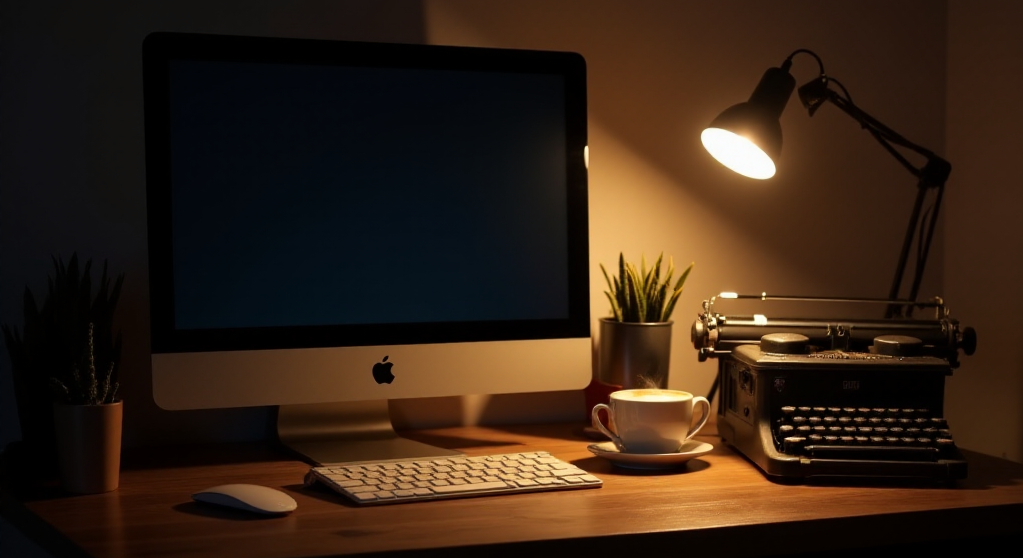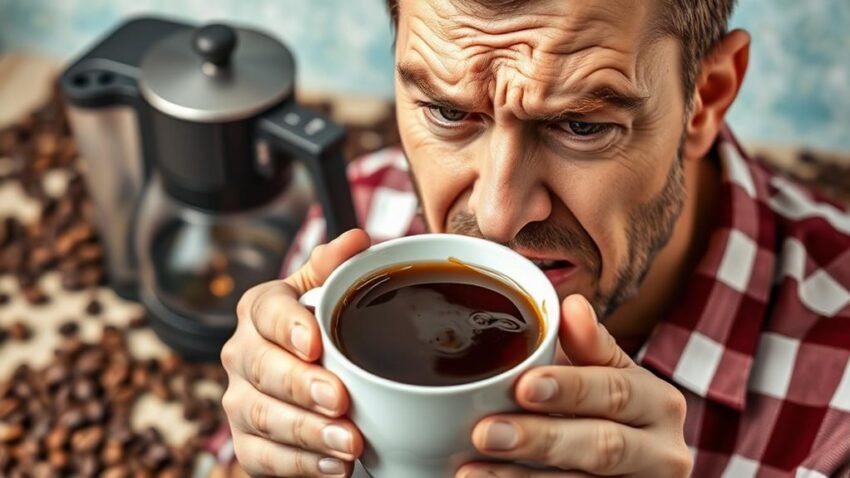I've often found myself pondering why my coffee doesn't quite hit the mark, and it's not just about personal taste. There are several factors that can turn what should be a delightful cup into a disappointing experience. Over-extraction can make it bitter, while under-extraction leaves it sour. But that's just the beginning; water quality, grinder performance, and even the temperature of the water all play essential roles. If you're as curious as I am about what might be going wrong, let's explore these elements together to uncover the reasons behind that subpar brew.
Over- or Under-Extraction
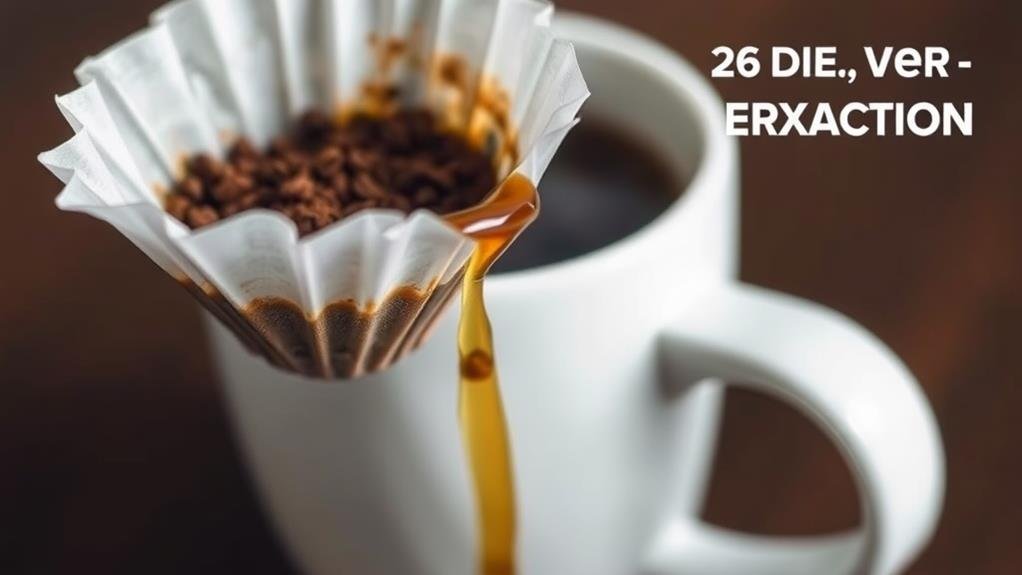
When brewing coffee, the balance between over- and under-extraction is pivotal. If your coffee tastes bad, it could be due to extraction issues. Over-extraction leads to bitter coffee with a lingering aftertaste, while under-extraction results in sour acidity and a lack of flavor. The grind size plays a vital role in this balance; using a fine grind size can help prevent under-extraction, while a coarser grind may alleviate over-extraction.
Over-extracted coffee happens when too much of the coffee's solids are dissolved into the brew. This can make your coffee bitter and unpalatable. On the other hand, under-extracted coffee occurs when not enough solids are dissolved, leading to sour notes and a weak flavor.
To fix these issues, adjusting the grind size can be a good starting point. A finer grind can help prevent under-extraction, while a coarser grind may alleviate over-extraction. Proper tamping is also pivotal; using the right pressure and tamper size ensures even extraction across the coffee grounds.
Regular cleaning of your equipment is crucial as well. Old coffee oils and residues can alter the taste of your brew and contribute to extraction problems. By maintaining balance in your extraction process and keeping your equipment clean, you can enjoy a well-balanced cup of coffee every time. Paying attention to these details will notably improve the quality and taste of your coffee.
Wrong Water Quality
When brewing coffee, the quality of the water you use can greatly impact the taste. Arabica coffee, known for its diverse flavor profiles, can be negatively impacted by tap water impurities, which can introduce undesirable flavors. Additionally, the mineral content of hard or soft water can affect extraction, leading to either a bitter or weak coffee. Using filtered water with the right balance of minerals is essential for achieving best flavor, especially when aiming to highlight the unique characteristics of Arabica varieties like Bourbon and Typica.
Tap Water Impurities
If you've ever wondered why your coffee tastes bad, the water you use might be the culprit. Tap water impurities can alter the flavor of your brew to a great extent. Here are some key factors to keep in mind:
| Type of Water | Impact on Coffee Taste |
|---|---|
| Chlorine in Tap Water | Harsh, chemical flavor |
| Hard Water | Over-extraction, resulting in bitterness |
| Soft Water | Under-extraction, leading to a weak or tangy taste |
| Minerals in Tap Water | Modified taste due to mineral presence |
| Filtered/Bottled Water | Enhanced flavor quality |
Chlorine in tap water can cause a harsh or chemical flavor in your brewed coffee. Hard water, rich in minerals like calcium and magnesium, can cause over-extraction and a bitter taste. Conversely, soft water lacking these minerals may result in under-extraction, producing a weak or tangy taste.
Using a water filter or opting for bottled water can help alleviate these issues. By ensuring the quality of your water, you can enhance the overall taste of your coffee. Understanding how different types of tap water impurities impact your brew is the initial step towards savoring a better cup of coffee.
Hard Vs. Soft Water
Hard water and soft water have distinctly different effects on the taste of your coffee, primarily due to their mineral content. Hard water, which is rich in minerals, can lead to over-extraction when brewing coffee. This means that too much of the coffee's soluble compounds are extracted into the water, resulting in a harsh, bitter taste. On the other hand, soft water lacks minerals and tends to cause under-extraction. Without enough minerals to facilitate proper extraction, the coffee may taste weak and sour.
The balance of mineral content is essential for achieving ideal extraction and flavor in coffee. When you use hard water, the minerals can overpower the delicate flavors of the coffee beans. Conversely, soft water may not provide enough interaction with the coffee grounds to bring out its full flavor profile.
Using filtered water with balanced mineral content is often recommended as it strikes a perfect balance between these extremes. This guarantees that your coffee is neither over-extracted nor under-extracted, providing a richer and more well-rounded flavor experience. Understanding the impact of hard and soft water on your coffee can help you make better choices about the water you use for brewing.
Inadequate Grinder
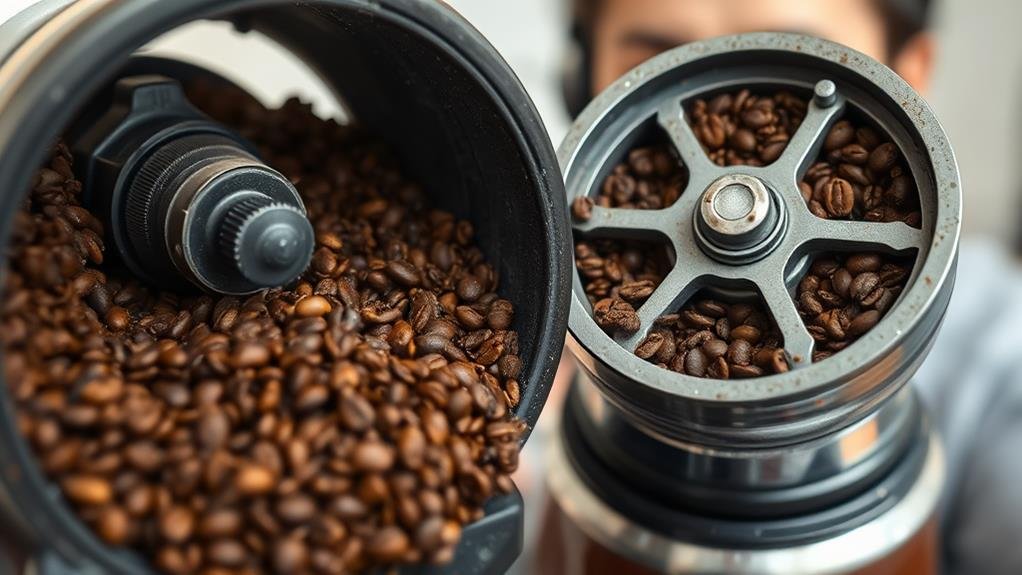
How often have you poured yourself a cup of coffee, only to find it tastes bland or bitter? One common reason for this is the use of an inadequate grinder. If your coffee grinder isn't doing its job properly, it can have a significant impact on the flavor of your brew.
Here are three key points to keep in mind regarding inadequate grinders:
- Inconsistent Grind Size: Inadequate grinders, often blade grinders, produce uneven grounds that lead to uneven extraction. This disparity can result in subpar coffee flavor.
- Heat Generation: These grinders produce heat, which can alter the flavor profile of your coffee beans before you even brew them.
- Impact on Extraction: The uneven grind size affects the balance of extraction during brewing, leading to a less desirable taste.
Investing in a burr grinder is essential if you want to achieve a consistent grind size. Burr grinders provide uniform-sized grounds, ensuring a more balanced extraction and a better-tasting cup of coffee. Unlike blade grinders, burr grinders don't produce excessive heat and deliver a more precise grind each time. By upgrading to a burr grinder, you'll notice a noticeable improvement in the quality of your coffee. It's an investment worth making if you're serious about enjoying great-tasting coffee every time.
Incorrect Water Temperature
After confirming your coffee is ground to perfection, the next factor to take into account is the water temperature. Using water that is too hot can greatly impact the taste of your coffee. Boiling water, which is above 205°F, can extract bitter compounds from the coffee grounds, leading to a harsh and unpleasant taste. This can make your coffee taste bad and unenjoyable.
The best water temperature for brewing coffee is between 195°F and 205°F. Staying within this range helps avoid the extraction of bitter flavors and ensures a smoother, more balanced taste. If you use boiling water directly, it can scald the coffee grounds, resulting in a harsh taste that you might find unpalatable.
To prevent this, allow the boiling water to cool slightly before brewing. This slight cooling ensures that the water temperature is at the correct level, which is essential for achieving a good-tasting cup of coffee. Consistent use of water at the correct temperature is key to guaranteeing you always enjoy your coffee without any bitterness or harshness. By paying attention to this detail, you can enhance your overall coffee-brewing experience and enjoy a better-tasting cup every time.
Improper Water-to-Coffee Ratio
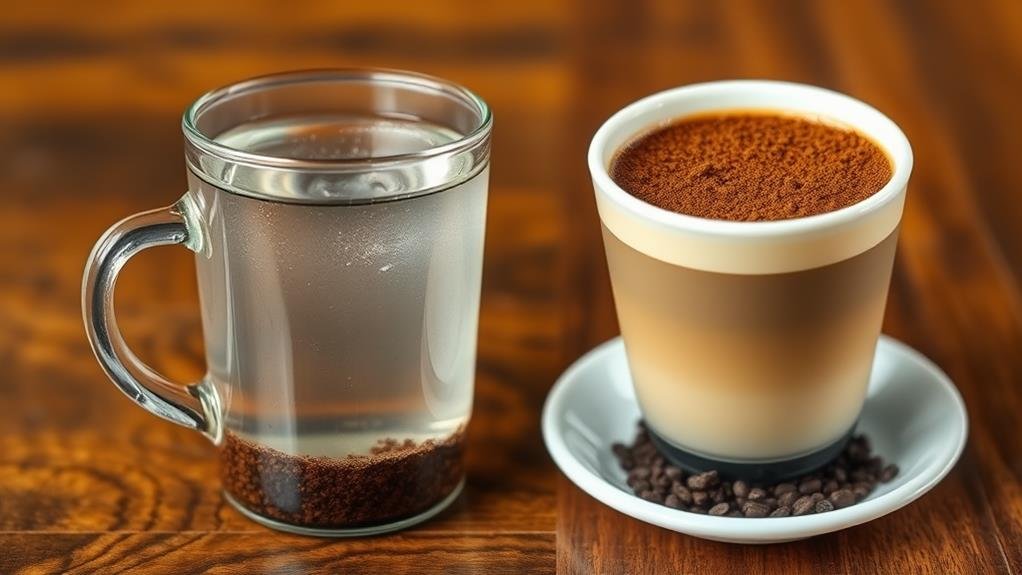
When brewing coffee, I often find that an improper water-to-coffee ratio can greatly impact the taste. Using too much or too little coffee in relation to water can result in a bad-tasting brew. Here are some key points to keep in mind:
- Water-to-Coffee Ratio Affects Strength and Flavor: The balance between water and coffee determines the strength and flavor of your brew.
- Balanced Extraction: A proper ratio ensures balanced extraction, which is essential for a delicious cup.
- Experimenting with Ratios: You can experiment with different ratios to find the perfect balance for your taste preferences.
Adjusting the ratio based on grind size and brewing method can also optimize the coffee's taste. For example, a finer grind might require less coffee relative to water, while a coarser grind may need more. By adjusting this ratio, you can achieve balanced extraction and avoid a bad-tasting brew. Experimenting with ratios allows you to tailor your coffee to your liking, guaranteeing every cup meets your standards of strength and flavor. Finding the right balance is vital to enjoying a consistently great cup of coffee.
Uniform Brewing Techniques
Beyond guaranteeing the correct water-to-coffee ratio, achieving a great cup of coffee also depends on consistent brewing methods. Uniform brewing methods are key to extracting flavors evenly from your coffee grounds. One essential aspect is using the appropriate water temperature and grind size. Water that's too hot can burn your coffee, while water that's too cold won't extract enough flavor. Similarly, if your grind size is off, it can lead to over-extraction or under-extraction, both of which can result in an unpleasant taste.
To achieve prime extraction, you need to grind your coffee just before brewing to ensure freshness and the right consistency. Regularly cleaning your grinder is also crucial; old coffee oils and dust can affect the taste of your freshly ground beans. Uniform brewing techniques help avoid common issues like over-extraction or under-extraction by guaranteeing that each grain of coffee interacts with water in the same way. By following a precise brewing method and using the right equipment, you can enjoy a balanced and flavorful cup of coffee every time. This attention to detail makes all the difference in bringing out the best in your coffee beans.
Lack of Research
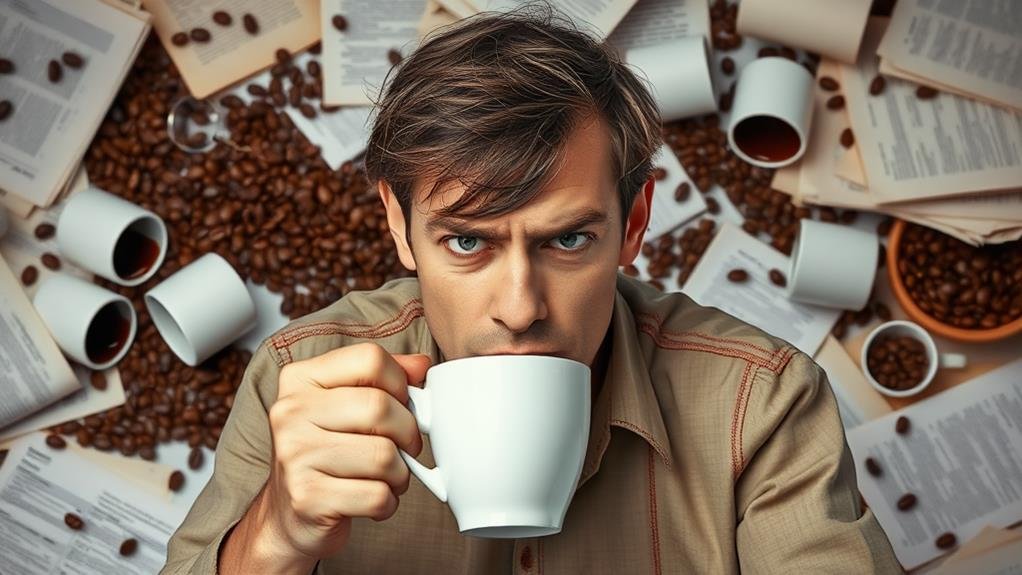
Lack of research on the complexities of coffee brewing can greatly influence the taste of your coffee. Without understanding key variables, you may end up with bad-tasting coffee that leaves much to be desired. Here are a few reasons why investing time in research is vital:
- Improving Coffee Flavor: Understanding coffee terminology, extraction principles, and brewing techniques is essential for enhancing coffee flavor. Without this knowledge, you might struggle to achieve the desired taste.
- Avoiding Undesirable Taste Outcomes: Researching coffee quality indicators such as freshness and grind consistency helps prevent unwanted taste outcomes. This guarantees that every cup you brew meets your standards.
- Enhancing Overall Experience: Investing time in learning about proper storage, grind sizes, and equipment maintenance significantly influences the taste of your coffee. It also contributes to guaranteeing that each brew is consistently good.
French Press Misuse
Misusing a French press can significantly impact the taste of your coffee. One of the common mistakes is leaving the coffee in the French press for too long, which can lead to over-extraction and bitterness. The best brew time for French press coffee is typically between 4 to 5 minutes with a coarse grind. If you let it sit longer, more of the coffee's oils and solids will be extracted into the water, resulting in an unpleasantly bitter taste.
Decanting the coffee promptly after brewing is essential to avoid this issue. Prolonged contact between water and grounds in a French press can make your coffee taste bitter because more compounds are extracted from the grounds over time. French press coffee is especially prone to over-extraction if not transferred to a carafe immediately after brewing. By paying attention to these details—brew time and decanting—you can prevent bitterness and enjoy a richer, more balanced cup of coffee. Proper use of your French press guarantees that each cup tastes as delicious as it should be.
Grinder Maintenance Issues
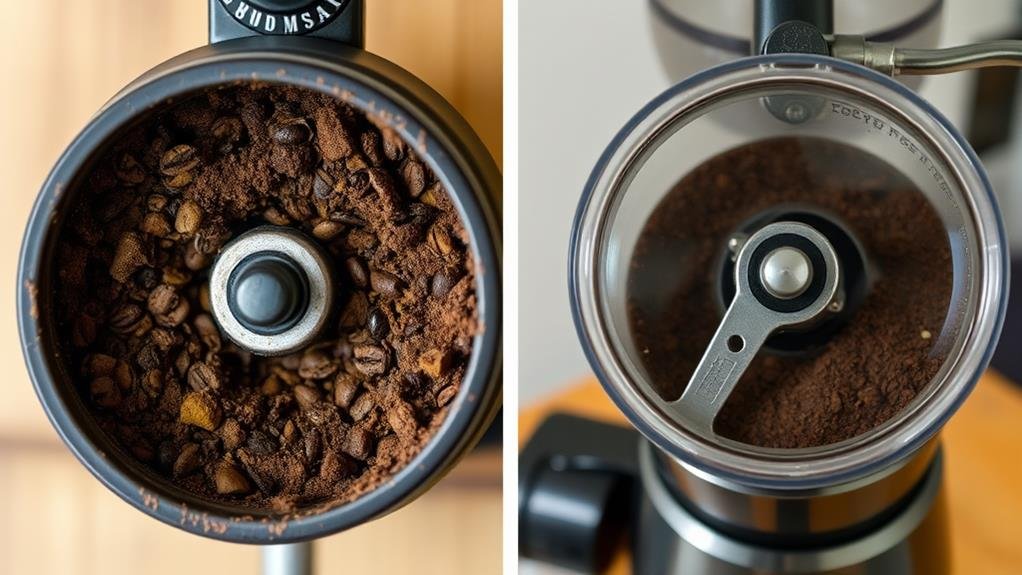
After securing your French press is utilized correctly to avoid bitterness, it's time to focus on another key element that can greatly impact the taste of your coffee: grinder maintenance. Neglecting to clean your coffee grinder can lead to significant issues with the flavor and consistency of your coffee.
Here are three reasons why regular grinder maintenance is essential:
- Flavored or dark roasted beans can clog grinders: These beans can leave behind oils and residue that adhere to the grinder's internal passages, affecting grinder performance and coffee quality.
- Oil buildup masks flavors: The oils from dark roasts can accumulate inside the grinder, leading to potential flavor masking and inconsistent extraction.
- Residue buildup affects extraction: Clogged passages due to residue buildup prevent proper extraction, resulting in off-putting flavors in your coffee.
Regular cleaning of your grinder is necessary to prevent oil buildup and maintain peak performance. By keeping your equipment clean, you guarantee proper extraction and avoid any unpleasant flavors in your coffee. This simple habit can make a significant difference in the taste of your coffee, so don't overlook it. Clean equipment ensures every cup tastes as excellent as it should.
Reheating Coffee
When it comes to coffee, few things can dampen the experience like reheating a stale cup. One of the primary reasons reheating coffee tastes bad is the loss of aromatic compounds. These compounds are responsible for the rich, vibrant flavor and aroma of freshly brewed coffee. When you reheat coffee, these delicate compounds break down, leading to a less vibrant taste that often feels flat.
Reheating coffee may make it taste dull compared to its fresh counterpart because the heating process cannot fully restore the aromatic compounds that have been lost. This means that no matter how hard you try, reheated coffee will generally not have the same depth and intensity as freshly brewed coffee.
For the best flavor experience, it's recommended to brew a fresh cup of coffee rather than reheating previously brewed coffee. However, if you must store brewed coffee for later use, make sure to store it properly to maintain its quality and prevent the need for reheating. Proper storage can help preserve the flavor and aroma, making it a better alternative than reheating.
Conclusion
So, why does your coffee taste bad? It could be due to over- or under-extraction, poor water quality, an inadequate grinder, incorrect water temperature, or an improper water-to-coffee ratio. Maybe you're misusing your French press or neglecting grinder maintenance. Even reheating coffee can ruin the flavor. The key is understanding these factors and making small adjustments to perfect your brew. Will you be able to solve the mystery of the bad-tasting coffee? Only time and experimentation will tell.
